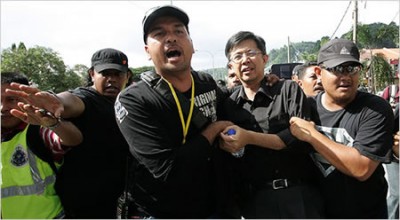Considering the implications of the presumption of innocence on the process of arrest, charge and remand in the criminal legal system, in two parts. The first part considers the process of arresting and charging of an accused and the conditions of remand.
It is a fundamental principle of criminal law that a person is presumed innocent until proven guilty.
This means that only after that person has been (i) charged, (ii) given an opportunity to be represented by a lawyer of his choice [expenditure permitting], (iii) given an opportunity to meaningfully defend himself [which means he must be given reasonable access to some of the relevant evidence to be used against him], (iv) tried before a fair and impartial tribunal and (v) finally, convicted on the evidence which reaches the standard of beyond reasonable doubt can he be called a criminal and be treated as one. Until he is convicted, you cannot call him a criminal. It follows that you cannot or, more accurately, should not treat him like a criminal.
But in our law abiding country do you notice how shabbily a person charged for a crime is treated? Let’s clarify terminology first: a person charged for a crime is an accused, because they have only been accused of a crime, not convicted for it. A person convicted of a crime is a criminal, not an accused.
Now let’s consider the criminal justice process system here as it relates to an accused.
Usually that person will be arrested. Sometimes we see this done with great fanfare with the media in tow. Upon their arrest they will be handcuffed and restrained. They are usually put in a lock up overnight with the police applying for a remand order for a few days purportedly to carry out their investigations. The lock up is simply a room with bars with the barest necessities – no comfort, no entertainment, no access to the world, and an open toilet to share.
When they are brought to court they will be handcuffed with others sometimes a chain of handcuffs. If you see them all shackled together, they look like the slaves of old – unkempt, smelly, miserable looking and guilty of something. When they are called up they are made to sit in a dock, where they will sit for the remainder of their trial, most of the times in handcuffs. If they are remanded they will be housed at the Sungai Buloh or Kajang prison in terrible conditions.

Let me tell you indirectly how terrible remand conditions are. Early in my legal career, I had a legal aid client charged with gang robbery. My interview with him indicated that he had a defence to raise against the charge. He, a repeated drug-related offender (an addict, all his previous was for possession), and was the only one charged because the actual robbers had fled and he was drugged out while it was happening. I told him we had a fair chance at fighting it.
Know what he told me? Forget it. He wanted to plead guilty. I asked him why. He told me that conditions in remand were so awful compared to the prison cells reserved for criminals. Those were better. More comfortable. He told me that the trial would take so damn long. 2 years? 3 years? Meantime, he would suffer in those conditions. He had been through it once. He didn’t want to experience it again. He would rather plead guilty so he could get better accommodation. I was not happy. I told him I felt he had a good defence. I would rope in my friends. We would fight it tooth and nail. He was finally persuaded and agreed to fight the case.
On the day for trial, I met him in court and confirmed his instructions to fight the case. I told him I had another matter to deal with and I would be back for his hearing immediately after. When I got back to him at about ten in the morning he had pleaded guilty and left the mitigation to me. When I asked him why he did that, he said he couldn’t take the remand anymore. He didn’t care anymore and wanted better conditions. Who would believe him anyway? My belief in his case was not enough. So I did the mitigation and off he went.
That was not the first case. I’ve heard a few more since then. They tell me the same thing. Please. Let me plead guilty. I cannot take the remand. I know you say I have a good case. The judge sure won’t believe me. Why would they? Please. Just let me plead guilty. I need to get out of here. Tak tahan. (Translation: Can’t stand it)
And those in remand are usually those who cannot afford bail. They are the poor. They are the dispossessed. They of the marginalized. They are the ones everybody has forgotten, even their own families. Nobody cares about anymore. They have no one and nothing, except their criminal history ahead of them. These are often the ones in remand. And there are so many of them that the remand cells become cramped, stifling and miserable. Because of that tempers flare, fights break out, struggles between the powerful and powerless ensues.
I once acted for a 17 year old boy charged for gang-robbery who was remanded in Sungai Buloh. At my first interview with him, I was near moved to tears. A scrawny, unkempt brown skinned boy. His face was haggard and there were dark rings under his eyes. His skin was dry and scabbed at parts. His hands, his hands were scabbed on the knuckles, with cuts at the back of his hands and the ends of his fingers were peeling. I asked him what happened.
It turned out that he was housed with the adult accused. They had turned him into their slave. He was forced to fan them all night – standing. If he got tired and fell asleep they beat him. He had to do what they ordered. If he didn’t he was beaten. And sometimes he was just beaten. They moved him out soon after I wrote in to complain.
I confess I have never been in remand. But from what I understand and have heard – it is a miserable, depressing and inhumane place.
courtesy of Loyarburok.com






No comments:
Post a Comment